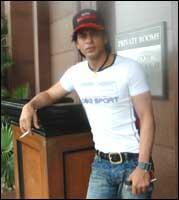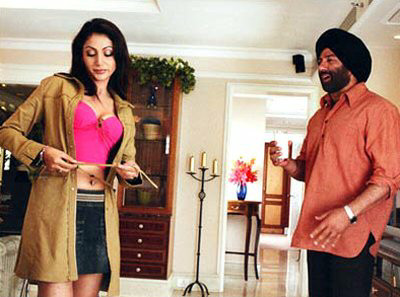It's the turn of the other big Khan to take a stand on the cigarette smoking ban. Shah Rukh Khan steps up to voice his thoughts about the ban. But first, yours truly steps up onto a soapbox ...
Welcome to the new form of filmic entertainment. The blur. The forest of digitally pixellated shapes that represent a form of post-modern neo-cubism. And it's missing one dimension. Depth. A two-dimensional rendering of space now comes with a new twist that exposes the artifice. And all because of some individual smoking on screen. The Government of India is probably planning to enter into negotiations with George Lucas for implementing an enterprise-wide cost-efficient multipartite venture to cleanse[sic] and bowdlerise every frame that features someone having anything to do with a dhumraka.nDikaa. The proposed (and imminent) ban on smoking in films (and TV serials as well, but I could care less about them -- after all the idiot box has been inundated with more evil fare thanks to people who, like Tyler Durden, deal in soap.
The problem with a blanket action like this is that the arguments in its favour are very compelling. Simply because the intent is commendable. I'm all in favour of eradicating smoking completely. Unfortunately, here is no approach (no precise list of things to implement) that can guarantee success. So everyone tries. In the US of A, they've designated numerous areas as no-smoking zones; they've got "smoking" and "non-smoking" sections in most restaurants. All I remember as India's achievement has been the statutory warning on cigarette packs (and in the numerous ads that always made smoking look cool). So now the administrative behemoth that is the Health department decides to be progressive. And don't forget that, this is a progressive step. Except, it's more like saying the right thing at the wrong time. There are several other less controversial ways that the Government could have approached this. Since we seem to be fatally hell-bent on emulating the West, why don't we provide yet another of the few examples where we get it right, and implement bans in select public places. The statutory warning didn't seem to dissuade smokers. Why should banning smoking in movies help? Sure, a lot of logical reasoning and predictive analysis can convince you of the potential of the move. After all, we have a lot of impressionable people watching the movies. We have a lot of people who provide fodder for the "life imitates art" camp. So by completely eliminating the display of the act of smoking, we make sure they don't cultivate wrong ideas like "smoking is cool" or (at a more affective but ostensibly milder level "it's ok to smoke").
NOTE TO READER: insert arguments from the camp that refutes the "life imitates art" camp (not to be confused with the "art imitates life" camp; a critical part of their agenda has nothing to do with our issue here).
Now that we have all the arguments in favour of the ban, let's consider a parallel to an old rule in horror films: what you don't see scares you more than whatever sophisticated monster someone can conjure for you. This means that your kids who have been shielded from smoking in the movies they watch will now be a tad more curious to see people around them "smoking". And now, you can chalk out a familiar sequence of events representing their discovery, curiosity, experimentation and (sometimes) eventual surrender to the fatal habit.
The other strong argument against this comes from art and the tenets of artistic expression. Of course, art has always been rather subjective. A work of "art" always finds an audience that appreciates it, and another audience that finds it offensive or pointless. Yet, it always deserves at least chance to be presented so that it can elicit reactions. Fundamentally though, it is a form of expression. And this ban knocks off an aspect of that expression. Of course, in the good old days of the Hayes Office, censorship stifled some filmmakers but also prompted other filmmakers to discover ways to get around all the restrictions. Our censor board has received flak for its actions (and a lot of people have already written its epitaph). Perhaps this ban might spark off innovations, which might �- who knows � give us some interesting films. That's the argument in favour of the ban. But one cannot ignore the possibility that is a precedent. Of the state burgeoning into a legalised righteous mob. A preview, if you will pardon the pun, of more similar bans. Pretty soon, we might be watching movies so bland and brain-dead they'll make Baghban look like a violent action drama. Now that is a horrifying thought.
Which brings us (in a rather boring and prolonged way) to a snapshot of what some of the leading figures of mainstream Hindi cinema (arguably, the most influential of all the bodies of Indian cinema) have to say. Aamir Khan's retort has been clear and simple.
At this point yours truly gets off the sandbox, and returns to attack the SRK interview ...
Shah Rukh Khan's take on the subject, however, is unfortunately hedgy. The article is titled "Why SRK favours smoking ban", but then since this is Rediff, it doesn't necessarily (or at al) reflect a correct summary of the article. Sure enough, two readings still leave me with the feeling that SRK didn't really take a stand. His take on various aspects of the issue are the safe answers that answer everything but satisfy no one. Consider the following: I don't think smoking needs to be an integral part of any character. It's as routine as a chair in the corner of a set or a bedsheet on a bed -- It shouldn't be something around which a film is designed. I don't think any film needs to be designed around a character who smokes.
Or the little mixed bag that marks the tail of the article: I'm very careful about bad language on screen. I don't use it. I won't. The most extreme emotions can be expressed without getting abusive. I'm not comfortable with bad language. But I don't dispprove[sic] of it. I believe cinema has to have the freedom to express itself in any way it likes. I may not like talking to a particular journalist. But that doesn't mean I'd stop him or her from writing.. Honestly, I'm not sure what one should really take away from that last mouthful. The cream of the article lies in the second-to-last paragraph: "
Actually, the more liberal a society becomes, the more stringent the laws are bound to be. In the US, you can buy a gun off the shelf, and then someone starts shooting down kids in a school. So they need strict laws to make guns accessible to people. With air travel being so easy now -- you can book tickets by e-mail -- airport security is tougher. In a banana republic, nothing is allowed. In our society, everything is allowed. Therefore we need to check the flow of liberal ideas. It isn't intolerance that triggers off laws against things like smoking or buying ammunition. More rights entail more obligations. " There's so much in there that can be used to make a strong point (although the opening seems more like an interesting observation in general than a useful point as regards the issue at hand). Everything diluted of useful content like the mainstream flicks he has been making.
I must admit that all this makes interesting reading though. It would be interesting to see the Big B's boring diplomatic take on the issue. Or get Vidhu Vinod Chopra to say something (since lately he's been brimming with a lot to say). Or Karan Johar (who seems like the person least affected by the ban). Or the Chopras. And just for some variety let's ask Daler Mehndi, Mallika Sherawat, our cultural ambassador Aishwarya Rai, Kareena Kapoor, Sanjay Dutt (oh what a loss!!) or Ajay Devgan (a catastrophe!).

would you accept a no-smoking vote from this man?






